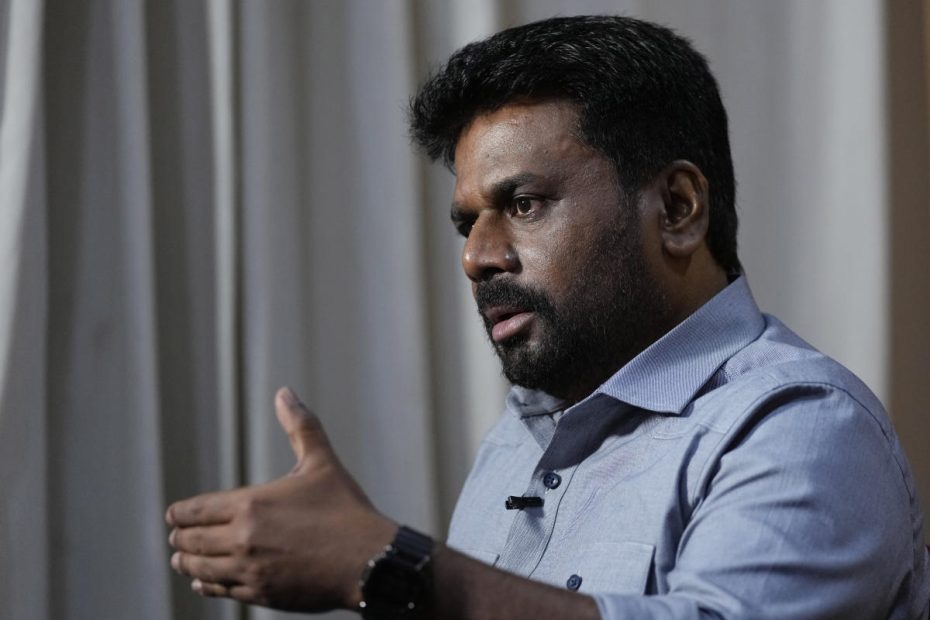COLOMBO, Sri Lanka (AP) — A working-class political alliance has emerged as a strong contender in Sri Lanka's presidential race, presenting itself as the agent of change millions have been calling for as an unprecedented economic crisis has led to disillusionment with mainstream political parties.
Anura Kumara Dissanayake, leader of the National People's Power alliance and presidential candidate, says he supports those who took part in the public protests that toppled then-President Gotabaya Rajapaksa in 2022. Protesters blamed Rajapaksa for an economic collapse that resulted in severe shortages of basic necessities such as fuel, cooking gas, medicine and food.
“People in our country have a great expectation of change,” Dissanayake told The Associated Press. “They wanted change and we are the agents of that change. All other candidates are the agents of the old, failed, traditional system.”
Unsustainable debt, ill-timed tax cuts, poorly planned import bans, the economic fallout from the COVID-19 pandemic and the government’s insistence on spending scarce foreign reserves to prop up the country’s currency, the rupee, led to the economic collapse in 2022.
Hundreds of thousands held street protests and seized control of key buildings including the President's Office and the Prime Minister's Office. Rajapaksa fled his official residence minutes before angry protesters stormed in. He later fled abroad and resigned.
Current President Ranil Wickremesinghe was elected by a majority of Rajapaksa supporters in parliament to serve the remainder of the term. Critics say the Rajapaksa family, many of whom held various positions in government before the ouster, received Wickremesinghe's protection in return for their support for laws he passed through parliament. People were angry about corruption, nepotism and economic mismanagement that the powerful family promoted.
Dissanayake says the people's desires for change were not realized because the protesters had no plan other than to topple the president and were not equipped to take charge. Wickremesinghe sent police to disperse them shortly after he took charge.
Wickremesinghe negotiated a bailout with the International Monetary Fund. In the two years since, inflation has fallen from 70% to around 5% under his administration. Interest rates have fallen, the rupee has recovered and foreign exchange reserves have grown. Creditor countries including India, Japan and France have agreed to defer debt repayments until 2028, giving the island nation room to rebuild its economy.
But professionals and businesses complain about higher taxes, and all people are affected by the high cost of living. The systemic reform that people expected has not materialized, and critics say economic recovery means little under a corrupt, unaccountable system.
Dissanayake says his government can bring about the change people want: a healthy economy in a corruption-free society.
NPP is a political movement consisting of 21 different groups including political parties, youth groups, women's groups, trade unions and other social groups. Dissanayake's original party is the People's Liberation Front, the main force behind the NPP coalition.
Dissanayake says that despite his party's long-held policy of nationalizing the country's resources, they accept economic freedom and foreign trade. He plans to maintain the IMF agreement while his government negotiates changes to ease the burden on the public.
“We cannot exit the existing IMF programme because we entered the IMF programme only after the country had collapsed financially. We believe there could have been another alternative. But now all the bilateral and multilateral agreements have been put into the IMF basket,” Dissanayake said.
“More attention should be paid to the hardships people will face if they continue with the IMF programme,” he said.
Dissanayake said his government will not seek to punish people accused of human rights abuses and war crimes during Sri Lanka's brutal 26-year civil war.
He said he would instead focus on investigating alleged human rights abuses and seeking a settlement with the families of victims, he said. Both government forces and separatist Tamil Tiger rebels have been accused of serious human rights abuses during the war, prompting the United Nations Human Rights Council to call for investigations and prosecutions.
“As for the issue of accountability, it should not be about revenge, it should not be about accusing anyone, but just about finding out the truth,” Dissanayake said. “Even the victims don’t expect anyone to be punished. They just want to know what happened.”
The People's Liberation Front, which led two bloody uprisings in 1971 and 1987-89 to take over the government in a socialist revolution that killed tens of thousands of people, supported a military solution to the civil war that ended in 2009.
Whichever candidate wins the presidential election, he or she will have to maintain a complex geopolitical balance between China and India. Both countries are indebted to Sri Lanka and are vying for power in the region. (Check and adjust as necessary) While China is economically secure, Sri Lanka is physically closer to India.
Dissanayake says his government will handle the geopolitical rivalry with utmost care.
Sri Lanka's presidential election will take place on September 21. A record 39 candidates have been approved. One candidate has died.
Wickremesinghe is also running in the election, largely on the basis of public support for his economic reform plan.
The more reliable polls until recently gave Dissanayake a significant lead over his main rivals, said political analyst Jehan Perera. “Regardless of their accuracy, AKD is a viable candidate to win the presidency,” he said, referring to Dissanayake by his initials.
“Those who want change above all will prefer to vote for AKD, because he has the least ties to the business and political elites that run the country,” he added.

